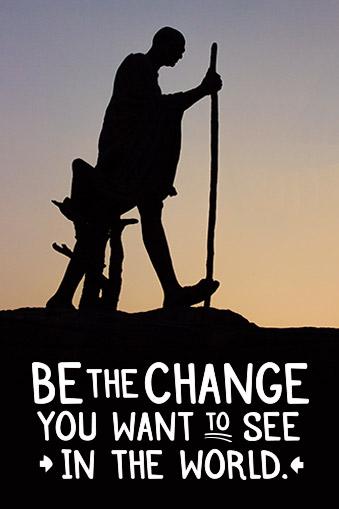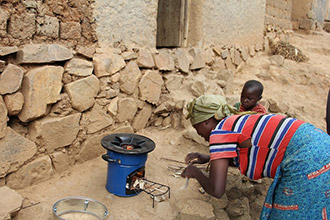
The Best of Both Worlds
B Corps like EcoZoom Find the Sweet Spot Between Doing Well and Doing Good
Mahatma Gandhi, leader of the Indian civil rights movement, inspired millions with both his words and his actions. Among Gandhi’s most widely quoted inspirations is the saying: “be the change you want to see in the world.” Generations after his tragic death, Gandhi’s legacy not only continues to influence humanitarian efforts, but has become the battle cry for a new breed of enterprises dedicated to the idea that success in businesses is not just about being the best in the world, but “the Best for the World®.”
Since 2010, B Lab, the Pennsylvania-based non-profit group that governs the independent third party B Corp certification, has sanctioned more than 1,400 B Corporations, across 121 industries and 38 countries. To become a certified B Corp, a company must voluntarily meet certain standards of transparency, accountability, sustainability and performance, according to B Lab. Underlying the B Corp. movement is the belief that businesses can do more than merely minimize their negative environmental and social impact on the world, and can, instead, actively use their businesses to promote the greater good. The certification parallels the principals of a Benefit Corporation, but does not offer the protections of a legally incorporated Benefit Corporation.
Among the growing B Corp ranks is EcoZoom, a social enterprise that makes clean-burning, portable wood- and charcoal-powered cook stoves that are healthy, efficient and eco-friendly. In contrast to the traditional “jiko” charcoal-burning stove used for cooking in regions like Kenya, EcoZoom stoves reduce smoke emissions by up to 70 percent and fuel usage by up to 60 percent, according to the company. As a result, smoke inhaled by cooks is significantly less toxic and less of a family’s very limited income is spent on fuel. EcoZoom also markets the Sun King solar-powered lighting solutions.
More people die each year as a direct result of dirty cooking and dirty lighting practices than from malaria, tuberculosis and HIV combined.
Amanda West, EcoZoom co-founder and chief communications officer, explained that enabling clean energy at the household level is a crucial element in the effort to raise the baseline of living in developing countries. “The consequences of dirty cooking and dirty lighting are a huge threat to global health, yet it is a problem that is not as widely discussed as things like malaria and HIV,” she said. “But, the reality is, more people die each year as a direct result of dirty cooking and dirty lighting practices than from malaria, tuberculosis and HIV combined.”
West and her partners started EcoZoom because they wanted to “be a part of a global solution,” but at the same time, they recognized that a missing piece to the puzzle of creating more sustainable development in emerging economies is the drive and productivity inherent in a for-profit business. “As a social enterprise, our goal is to take the for-profit model into a space that is dominated by government agencies, aid organizations and NGOs.”
 She credits the B Lab Business Impact Assessment (BIA) test for giving the inexperienced entrepreneurs much-needed guidance into the various operational requirements of managing a successful social enterprise. “We had focused so much on how the product was going to make an impact on the world, we didn’t think about our business operations and how the way we operate can also contribute to the overall positive impact of our efforts,” she said.
She credits the B Lab Business Impact Assessment (BIA) test for giving the inexperienced entrepreneurs much-needed guidance into the various operational requirements of managing a successful social enterprise. “We had focused so much on how the product was going to make an impact on the world, we didn’t think about our business operations and how the way we operate can also contribute to the overall positive impact of our efforts,” she said.
For example, she noted that the BIA includes a comprehensive section on significant suppliers. “The first time we took the assessment, we realized we didn’t know any of the answers to these questions about our significant suppliers. That got us thinking about all the things that we should know and gave us a roadmap to work with our suppliers to gather this intelligence.”
West and her partners found that working in emerging economies like Kenya can raise a unique set of supply chain challenges. “The downstream supply base can be very limited. There may only be one warehouse supplier who can meet our needs so that one supplier may be our only option, but that does not mean that we have to sacrifice our values.”
As a social enterprise, EcoZoom’s mission is not complete if the company is not focusing on people, planet, and profit all at times, West noted. So, when faced with a supplier dilemma, EcoZoom takes a holistic approach to problem solving, committing to always find a win-win solution. “We understand that, like us, our suppliers are in business to make money, so we won’t ask things of them that are going to reduce their profitability.”
As a social enterprise, EcoZoom’s mission is not complete if the company is not focusing on people, planet and profit all at times.
Though CSR initiatives are generally an add-on to many existing corporate business strategies, the B Corp certification can be a great next step in more fully integrating CSR into the business, West said.
“Big, multinational companies will obviously have more legacy issues to contend with,” West said. “But the more we have larger, high-profile companies like Patagonia, Ben & Jerry’s, Etsy and Kickstarter pursuing B certification and incorporating as Benefit corporations, it will show other big companies that they can, if they truly want to, leverage their traditional business structure to effect positive social and environmental change.”
EcoZoom’s journey over the past five years is proof positive that it is possible to use the power of business to create social and environmental change, while at the same time growing profitably. West reported that EcoZoom started with just $40K in founder funding; last year, the company reported revenue of over $10M. “And we did it while staying true to our values – that is our greatest success.”
West’s advice to businesses, big or small, thinking about taking the B Lab BIA test: “Don’t be afraid of bad results. They are just an opportunity for improvement and you don’t have to improve everything at once. Take a longitudinal approach to impact and don’t sacrifice the long-term benefit/impact for short-term wins.”